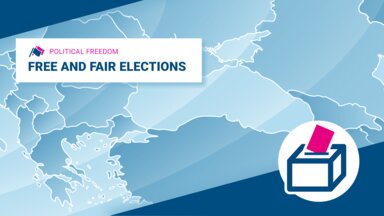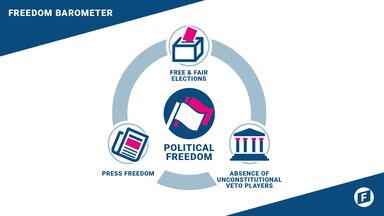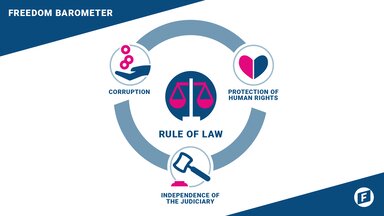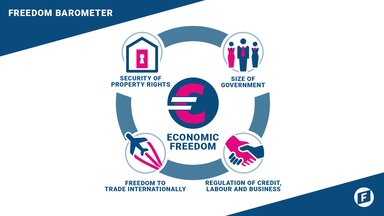Has 2010-2019 been a lost decade of reforms in the region? Find out the special anniversary edition of our comparative index ‘Freedom Barometer’.
-
DOWNLOAD the FULL REPORT here.
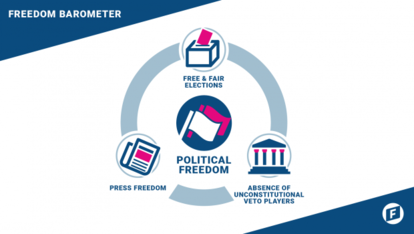
POLITICAL FREEDOM
The wave of building, strengthening, and shaping liberal and democratic societies over decades in Europe was interrupted by an outburst of autocratic tendencies in recent years, causing a deterioration of freedom on the political playground. Though such autocratic beliefs had existed long before, all the time “flirting” with the flaws of democracy like a “patient on appliances”, it was the citizens’ accumulated dissatisfaction with democracy and a change in the everyday habits and needs of citizens – mostly of a technological nature or caused by its developments – that created a convenient fracture allowing a re-emergence of autocracy. Using populist and harsh rhetoric in combination with the manipulation of public opinion, conservative and nationalistic political leaders emphasized citizens’ dissatisfaction with democracy to the degree that even a crackdown on independent democratic institutions and basic human rights became justifiable to many.
Electoral processes have been increasingly shaped by the rise of right-wing populism, of fake news, manipulative, scaremongering propaganda, and sharp divisions in society alongside political lines, undermining their fairness. In some countries, these methods are year after year becoming even more repressive so that we hardly can speak about electoral freedom any more.
Speaking about Unconstitutional Veto Players, this rise of autocratic tendencies has empowered elected political leaders to a level which allows them to abuse constitutionally granted power and to become a major challenge to the rule of law and democracy in this decade.
Media changed over the last decade. The speed information travelled increased, the price of its dissemination dropped drastically, information outreach broadened considerably and – consequently – the impact of information was significantly enhanced. Such developments on one hand led autocrats in Europe to consider a free press as an “enemy of the people” and to label many media workers as such, while on the other hand readily using the great opportunities that media decentralisation offered, such as public manipulation.
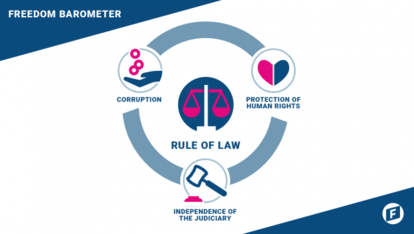
RULE OF LAW
The rule of law is a cornerstone of the European way of life. Membership in the Council of Europe is tied to respect for basic European values, while accession to the European Union depends crucially on their advance. During the last decade, new EU member countries mostly advanced further in this field, as did candidates. Even when political elites had regressed into populism, it has been civil society in all those countries that reminded them of European values and principles. Thus, there are more successes than worrisome stories and, on average, some progress in the entire region is undeniable.
Advance of the rule of law, as seen through less corruption or a better respect for human rights, would be far steadier if the main element of it – the judiciary and its professional and impartial treatment of all citizens and parties at courts – was more independent from political, business, criminal, or other interest groups. Unsuccessful, or reversible, reforms of the judiciary throughout the region have – alas – marked the decade.
To fight corruption, more than an independent, efficient judiciary or other prosecution is needed. Where civil society was stronger, whistle-blowing was a powerful deterrent against all abuses of power for illicit personal or group gains. And, primarily, shrinking the very field where corruption occurs – government intervention in the economy and society – proved to be the first prerequisite for having less corruption. Countries which liberalised their economy, and parallel to that reformed their administration and judiciary, while leaving enough space for civil society control of those in power, have managed to decrease the level of corruption, sometimes tremendously.
Human rights saw mixed trends. While those directly affecting political life, such as freedom of thought, speech, or assembly, suffered when some countries regressed into populism or authoritarianism, the rights of minorities, especially sexual but also ethnic or other, have advanced. Women’s participation in politics, economics, and social life in general rose and with it, an awareness that the freedom of one half of the population has been grossly endangered by domestic violence, human trafficking, and other abuse. Hate speech, often going hand in hand with fake news or other enemies of truth, reason, and freedom, has put social and inter-ethnic stability in question. Finally, new challenges to human freedom, such as surveillance schemes enabled by new technologies, need still be answered if the value of privacy is to be preserved and the right balance between the right to privacy and the rights to security and safety is to be found.
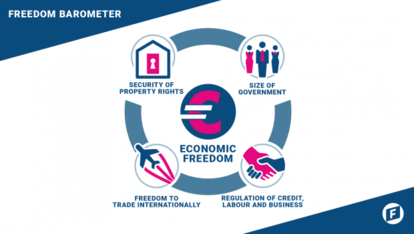
ECONOMIC FREEDOM
Economic freedom is a function of the current political equilibrium. A high level of economic freedom indicates an open social order, which fosters competition and innovation, leading to investment and a higher level of economic growth. On the other hand, a low level of economic freedom is connected to an order that limits access, which creates obstacles to competition and rents for insiders. Therefore, the level of economic freedom has been mostly constant during the previous decade since there were no deep changes in underlying social structures.
Property rights remain mostly secure across the region. Problems in this area are connected to political influence over the judiciary, corruption and weak administrative capacities. Secure property rights seem to go hand in hand with high taxes – countries with lower tax rates in the east of the continent also have less secure property rights, with extortions, forced buy-outs and property seizures supported by administrations or judiciaries through clientele networks and corruption. Even though judicial independence in advanced countries guarantees property rights, in practice these can be severely limited by very long legal procedures.
The size of government in Europe remains high by international comparisons due to the high costs of the welfare state, whose high expenditures need high taxes. There is a clear trend – more advanced countries have a higher proportion of public expenditures. During the previous decade, there were some attempts to limit government expenses or to change the policy mix by reducing taxes on capital and labour to pursue higher economic growth, but these were limited in scope. Rising government expenditures for retirement benefits and healthcare costs due to demographic changes and ageing populations will become a significant strain on public finance, while labour market disruptions caused by the advances of AI will create unprecedented challenges. High public debt incurred after the 2009 recession remains a problem, apart from those CIS countries rich in natural resources and a few countries in the CEE.
Regulation continues to improve. While credit regulation has long been liberalized, and the introduction of ‘flexicurity’ in labour markets continued, the most significant improvements were made in the regulation of business activities. But the actual implementation of these regulatory reforms remains an open question, especially in countries with high corruption and political clientelism. However, business regulation has also been used as an obstacle to market entry by limiting competition and capturing rents. But overall, Europe remains a place with a good regulatory environment for business operations.
Populist sentiment has fuelled protectionist ideas but these, for the most part, did not translate into protectionist policies, so free trade is still the main game in town. The EU’s common trade policy makes the EU trade bloc one of the most open in the world, with low tariffs but with significant regulatory and other non-tariff trade barriers. However, the future trade deal between the UK and the EU may have a significant impact on trade relations on the continent: it might be business as usual but with new trade barriers. Further EU accession will increase trade freedom in the Western Balkan region, though current political proposals for deeper regional integration do not have much appeal. Russia continues to use its trade policy (including its import substitution program) for political purposes, but the EAEU did not lead to deeper economic integration in the region.
Have a look at the freedom trends in 3 categories with 10 indicators below.
-
Political Freedom: 10 Years of Freedom Barometer
-
Free and Fair Elections: 10 Years of Freedom Barometer
-
Absence of Unconstitutional Veto Players: 10 Years Freedom Barometer
-
Press Freedom: 10 Years Freedom Barometer
-
Rule of Law Freedom: 10 Years Freedom Barometer
-
Independence of the Judiciary: 10 Years Freedom Barometer
-
Corruption: 10 Years Freedom Barometer
-
Protection of Human Rights: 10 Years Freedom Barometer
-
Economic Freedom: 10 Years of Freedom Barometer
-
Security of Property Rights: 10 Years Freedom Barometer
-
Size of Government: 10 Years Freedom Barometer
-
Freedom to Trade Internationally: 10 Years Freedom Barometer
-
Regulation of Credit, Labour and Business: 10 Years Freedom Barometer

